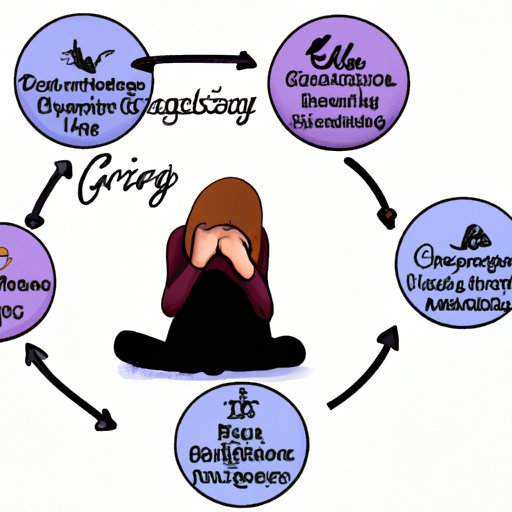
Introduction
Grief is a natural response to loss, and it is something everyone experiences in their lifetime. Whether it’s the death of a loved one, the end of a relationship, or a major life change, going through the grieving process can be incredibly difficult. However, it’s important to remember that grief is a process, and there are resources available to help individuals cope and heal. In this article, we will explore how to deal with grief by understanding the stages, developing a support system, trying coping strategies, honoring the memory of a loved one, seeking professional help, and taking the time to heal.
Understanding the Stages of Grief
The five stages of grief are denial, anger, bargaining, depression, and acceptance. While not everyone experiences these stages in the same order and intensity, understanding them can help individuals recognize and cope with their emotions.
Denial is often the first stage of grief, where individuals struggle to accept the reality of their loss. Anger can follow, where individuals feel intense frustration or even rage about their situation. Bargaining involves attempting to find ways to undo or prevent the loss, while depression can lead to a sense of numbness, hopelessness, or loneliness. Finally, acceptance is about coming to terms with the loss and beginning to move forward.
It’s important to note that these stages are not linear, and individuals may find themselves circling back to previous stages before reaching acceptance.
Developing a Strong Support System
No one should have to go through the grieving process alone. Having people to talk to about your feelings and experiences is an essential part of coping with grief. This support can come from family, friends, or support groups.
It can be difficult to communicate your grief to others, but it’s important to be honest and open about your feelings. Let loved ones know what you need from them, whether it’s a listening ear or a physical presence. Support groups are also a great option, as they provide individuals with a safe and supportive environment to share their stories and connect with others who are going through similar experiences.
Coping Strategies
While everyone grieves differently, there are a variety of coping strategies that individuals can try out to manage their emotions. Mindfulness and meditation can help individuals stay present and calm during moments of intense grief. Physical activity, such as going for a walk or practicing yoga, can help release pent-up emotions and produce endorphins that promote feelings of well-being. Creative outlets, such as writing, painting, or playing music, can provide individuals with a way to express themselves and process their emotions.
It’s important to remember that coping strategies are not a one-size-fits-all solution. What works for one person may not work for another. Try out different strategies and find what works best for you.
Honoring the Memory of a Loved One
Honoring the memory of a loved one who has passed can be a positive and healing way to deal with grief. Creating a memorial, such as a photo album or a memory box, can provide individuals with a way to remember and celebrate their loved one’s life. Supporting a charity or cause that was important to the deceased can also be a meaningful way to honor their memory.
It’s important to involve family and friends in these actions, as coming together to honor the memory of a loved one can provide comfort and support during a difficult time.
Seeking Professional Help
Seeking professional help is a sign of strength, not weakness. Speaking with a therapist or counselor can provide individuals with a safe space to process their emotions and work through their grief. However, finding the right therapist may take time and effort. It’s important to do your research and find a therapist who specializes in grief counseling and with whom you feel comfortable.
During therapy sessions, individuals can expect to talk about their feelings, experiences, and memories related to the loss. Therapists may also teach coping strategies and offer guidance on how to navigate the grieving process.
Taking the Time to Heal
Grief is a process, and it’s important to take the time to heal and come to terms with your loss. Self-care activities like relaxation, journaling, or spending time in nature can provide individuals with a way to care for themselves during a difficult time.
It’s also important to communicate with loved ones and employers about the need for time off. Taking time to grieve and heal is not a sign of weakness, but a necessary part of the process.
Conclusion
Dealing with grief is never easy, but with the right resources and support, individuals can come through the grieving process stronger and more resilient. Whether it’s understanding the stages of grief, developing a strong support system, trying coping strategies, honoring the memory of a loved one, seeking professional help, or taking the time to heal, there is no right or wrong way to handle grief. Remember to be patient and kind to yourself during this difficult time, and know that healing is possible.





